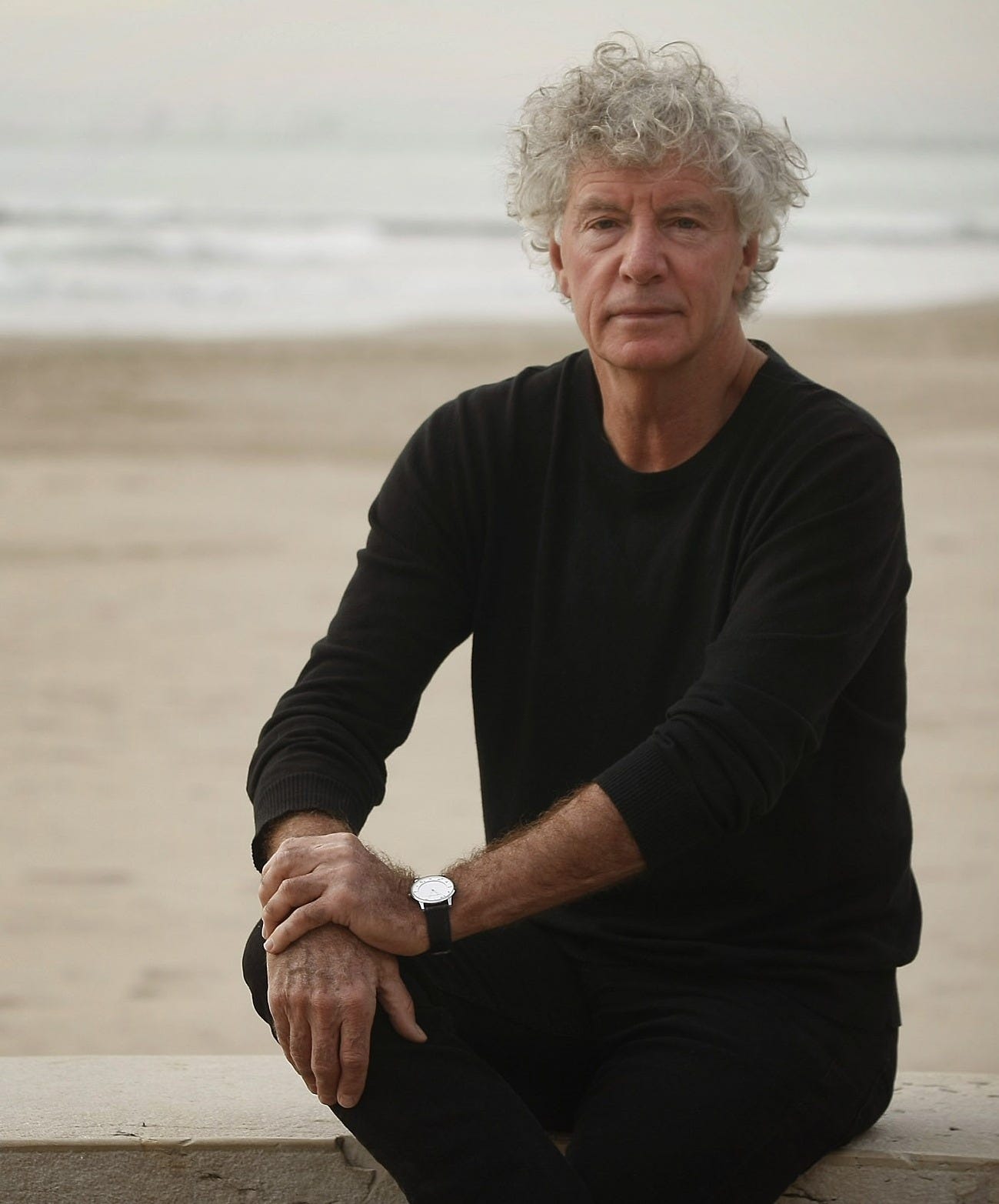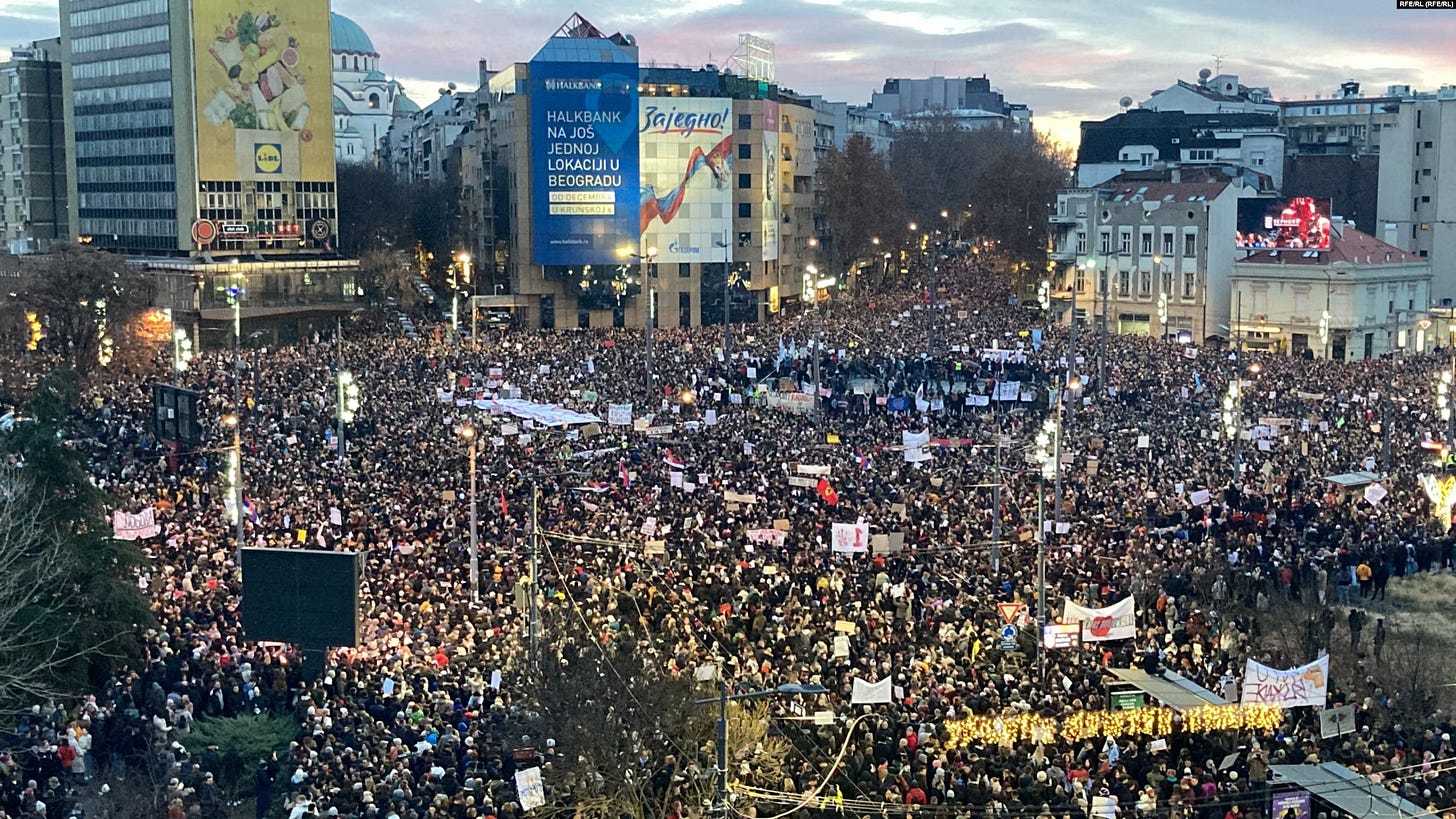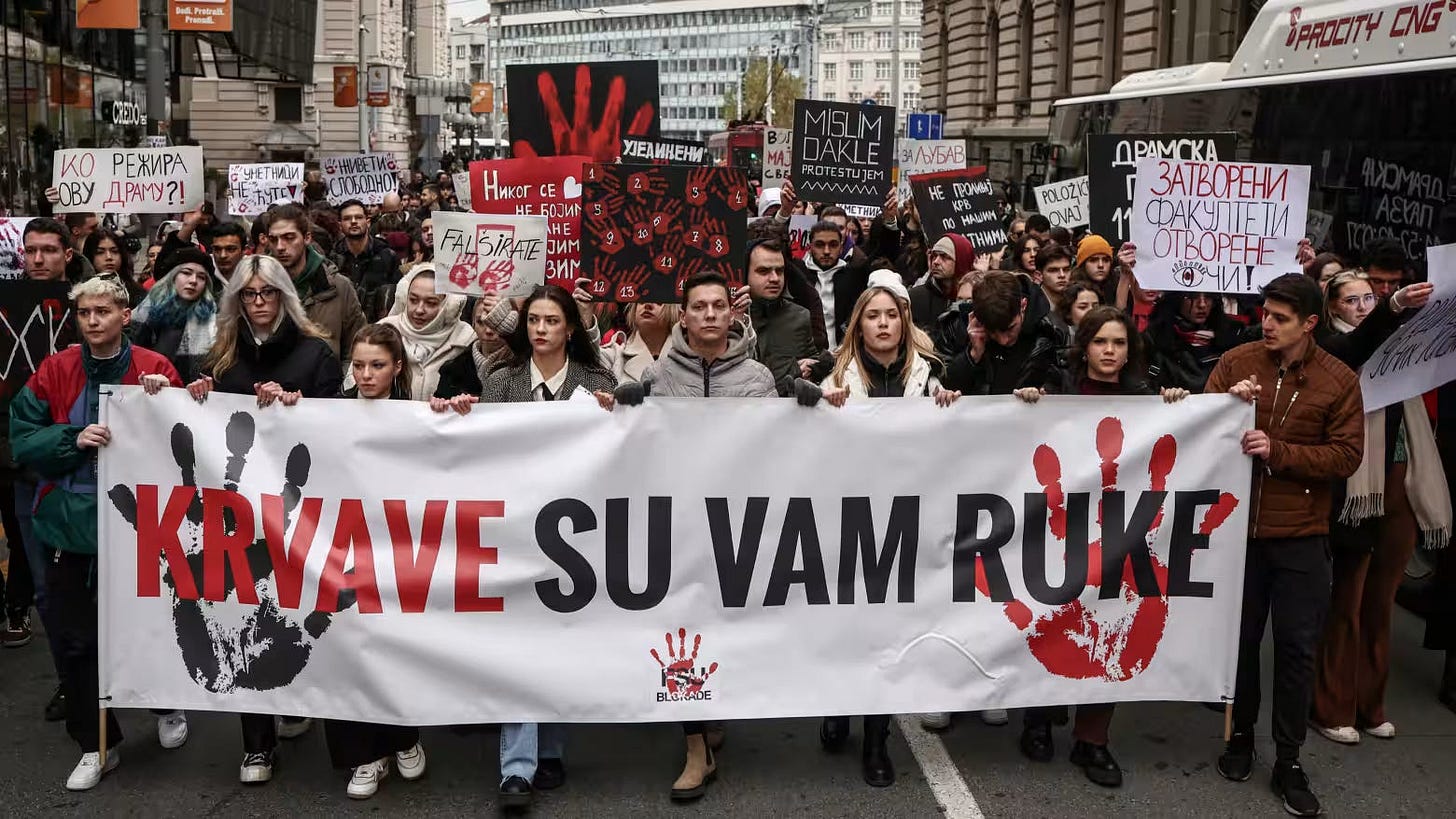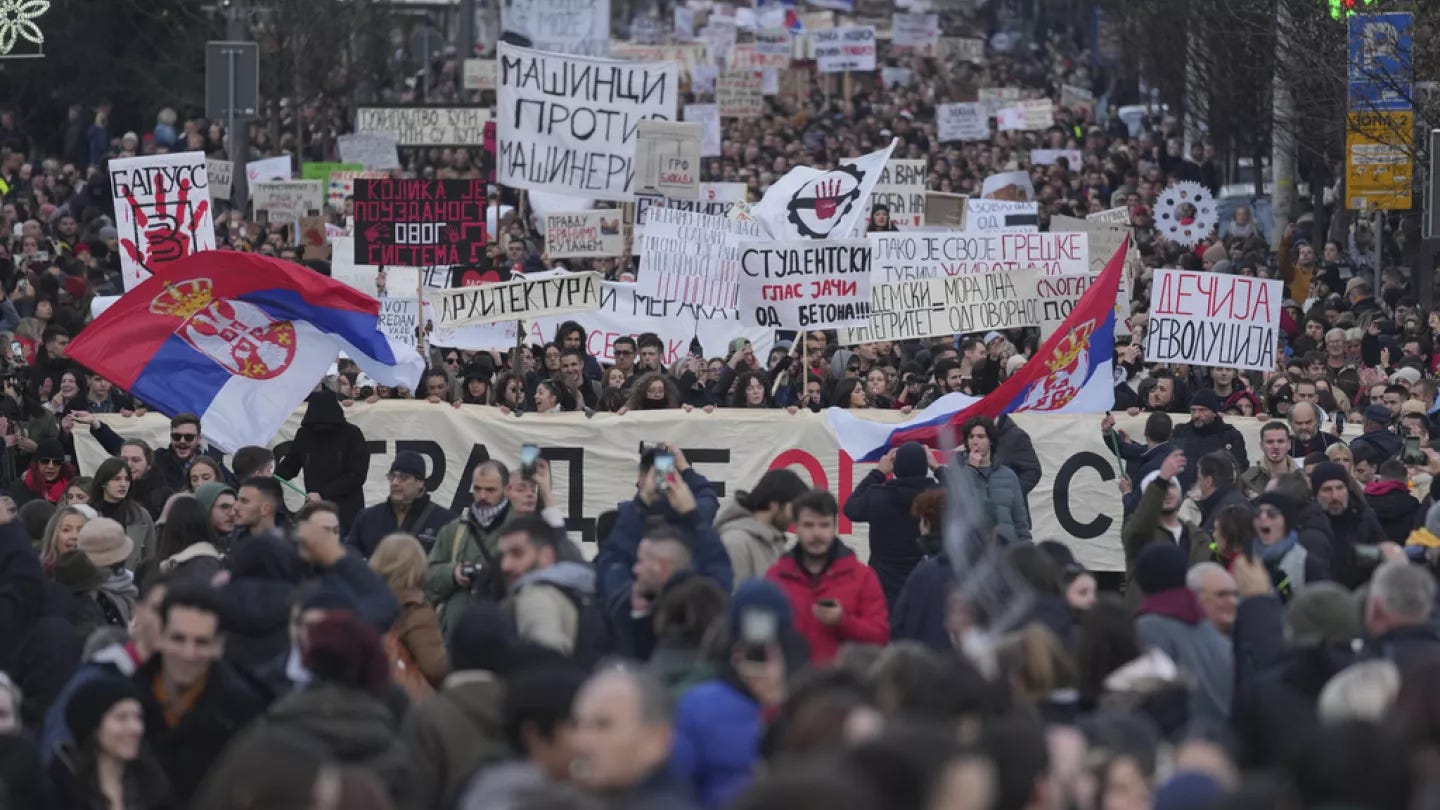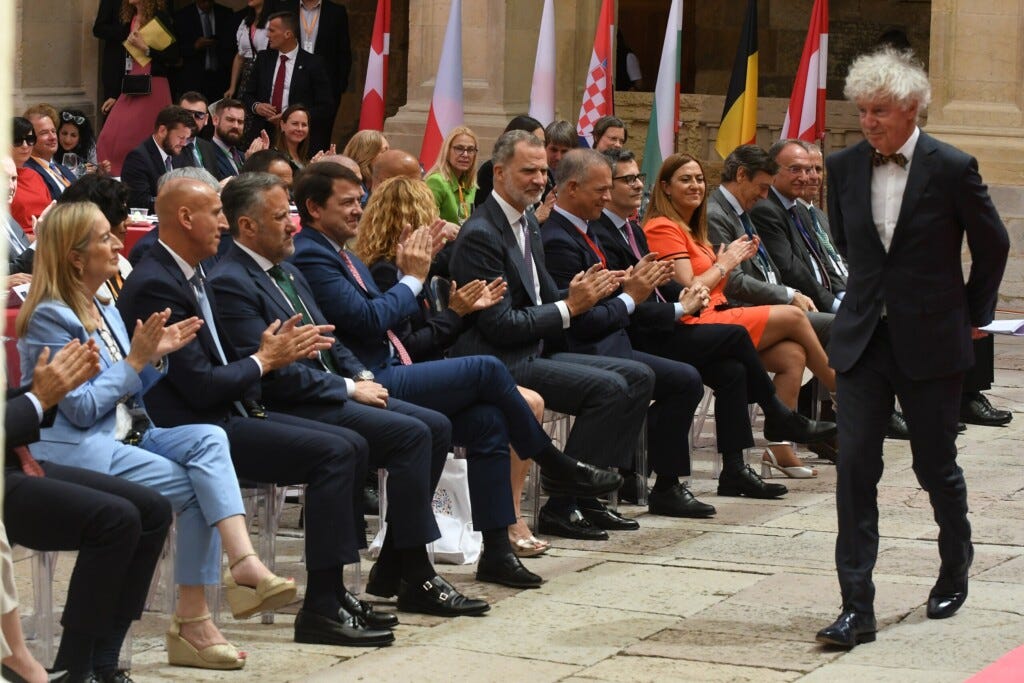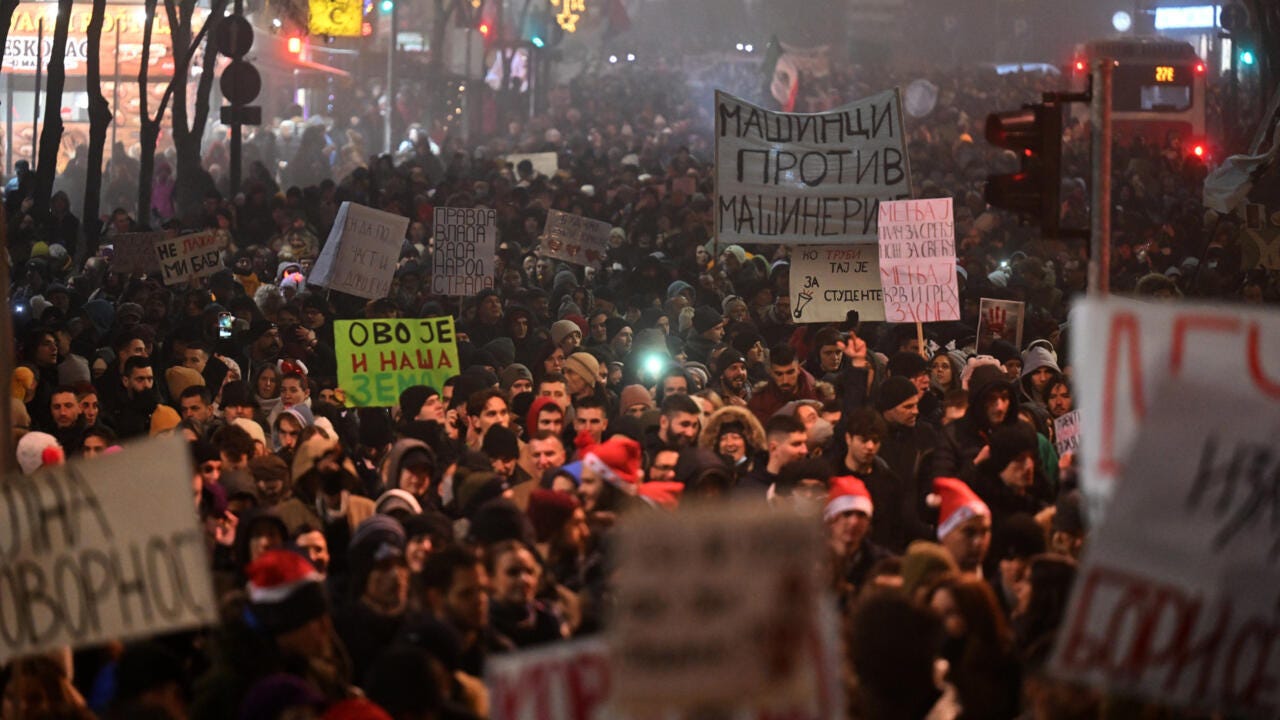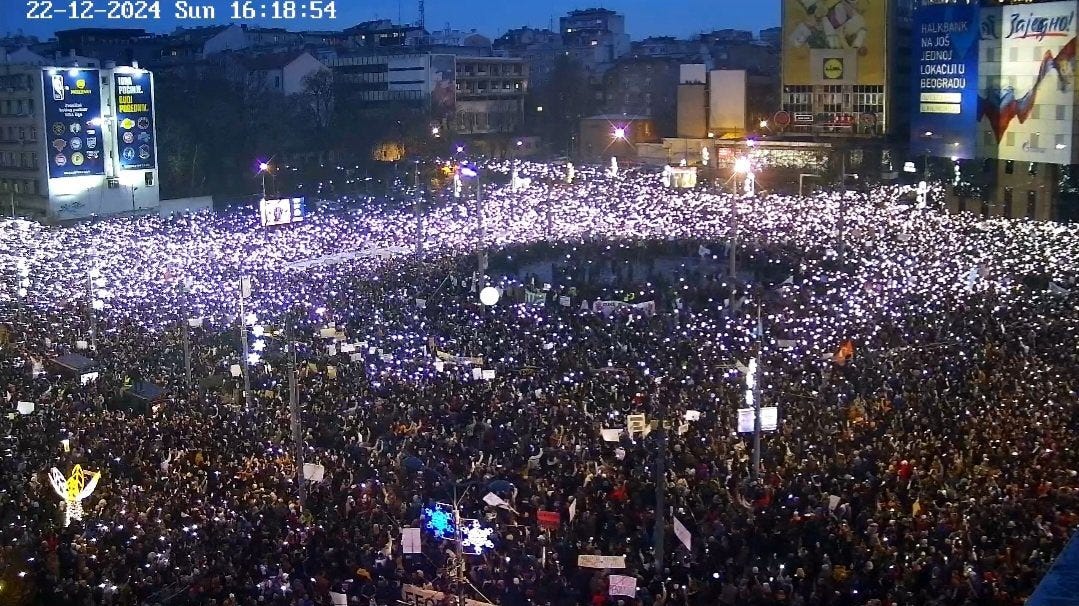The Serbian government is a modern despotism: an interview
Amidst the most serious student uprising in Europe since 1968, the following interview with the distinguished journalist Stefan Slavković was published in Serbian in Belgrade’s Radar magazine, issue 46, January 25th 2025. For curious readers, a rough English translation is also provided below.
Vučićev režim je moderna despotija
Dešavanja u Srbiji pokazuju da stasava generacija koja može da osmisli svoje horizonte i onda s njih nastavi da upozorava protiv trendova koji joj se ne sviđaju. Protivljenje povratku u srednji vek ohrabruje
Razgovor sa Džonom Kinom, profesorom politikologije na Univerzitetu u Sidneju, počinje njegovim zabrinutim pitanjima: „Video sam da vam je dan počeo turbulentno, kako je devojka? Je li napad bio nasumičan ili naručen, šta mislite?“ Odvio se u četvrtak i vest da je M. P. (38) uoči blokade „Zastani, Srbijo“ kolima udario i teško povredio studentkinju koja je u tom trenutku stajala na asfaltu očito je obišla svet. Kinova lucidnost, slikoviti humor i erudicija – populizam je nazivao „autoimunom bolešću demokratije“, despotizam „fantomskom demokratijom,“ a Kinu „galaktičkom imperijom“, uz obavezna obrazloženja krcata referencama – zbog kojih je jedan od najradije slušanih političkih teoretičara današnjice, i ovog puta su prisutni, ali postoji i višak zainteresovanosti, možda i ozbiljnosti s njegove strane. „Mnogo puta sam bio u Srbiji, mnoge moje knjige prevedene su na vaš jezik, a kao neko ko živi u Sidneju, upoznat sam s ovdašnjom srpsko-hrvatskom zajednicom koja se i dalje ponajpre određuje kao jugoslovenska. Zato dešavanja kod vas pratim s uzbuđenjem, ali i strahom. Jer, nisu nimalo naivna. Napadi na demonstrante i blokadere mogu se opisati kao kaubojski, a jutrašnji može da se sagleda kao prelomna tačka jednog dugog procesa. Od budućnosti zavisi kako ćemo ga tumačiti. Ali jasno je da se stvari otimaju kontroli“, rekao je Kin za Radar.
Tumačenja pomalo zavise i od prošlosti – česte su paralele sa studentskim demonstracijama iz 1996. na 1997. godinu, koje ste takođe pratili.
Tako je, tada mi je Dragica Vujadinović, filozofkinja i profesorka na Pravnom fakultetu, poštom poslala materijal o demonstracijama. Neke sličnosti postoje. Građani su i tada i sada osvajali i preuzimali javni prostor. Tada su se kretali ukrug, kao u zatvoru, sada stoje i ne pomeraju se. Oba gesta imaju značenje. Slična je i karnevalska dimenzija. Nose se baneri, peva se, razgovara, lupa se u šerpe, a reaguju i pojedinci iz javnog života, poput pisaca, glumaca, profesora… Slično je i to što građansko društvo dolazi do novog izražaja. Ipak, postoji jedna velika razlika – glavno sredstvo medijske komunikacije pre skoro trideset godina bila je televizija. Nisu građani slučajno jajima gađali zgradu javnog servisa. Predsednik Milošević i njegova ledi Magbet tada se nisu previše oglašavali. Vidim da je predsednik Vučić sveprisutan i da pokušava da amortizuje štetu i preusmeri narativ.
Jedan od razloga zašto u tome ne uspeva je činjenica da ovaj narodni ustanak pripada mladima, a oni komuniciraju drugačije. Posredi je ono što nazivam digitalnom pobunom, koja nastaje kada protok informacija nije jednosmeran i ne služi umirivanju tenzija, već podrivanju dominantnih narativa. To je po donosioce odluka mnogo opasnije od pukog izlivanja revolta. Činjenica da sada svako na svom telefonu može da vidi snimak napada na studentkinju dovoljan je dokaz. Na koncu, glavna razlika je u tome što ove demonstracije imaju zelenu nijansu, naslanjaju se na prethodno nezadovoljstvo protiv Ziđina, Rio Tinta, ali i izbornih prevara, rasta nasilja… Na osnovu svega, rekao bih da su roditelji današnjih demonstranata, koji su i sami demonstrirali krajem devedesetih, svoju decu lepo vaspitali i opremili za život.
Predsednik Milošević i njegova ledi Magbet tada se nisu previše oglašavali. Vidim da je predsednik Vučić sveprisutan i da pokušava da amortizuje štetu i preusmeri narativ. Jedan od razloga zašto u tome ne uspeva je činjenica da ovaj narodni ustanak pripada mladima, a oni komuniciraju drugačije
Kako vam deluju Srbija tada i Srbija sada?
Onomad ste imali antibirokratsku i „jogurt“ revoluciju, imali ste ratove, a država se iz jugoslovenskih okvira svela na manje. Milošević je kao bankar preodeven u militarističkog nacionalistu odgovorio zahtevima nove uloge. Ko se bunio protiv njega takvog, bunio se protiv takve Srbije, visokih nivoa korupcije, kolona izbeglica, inflacije… Vučićev režim je mnogo više sofisticiran. Nazvao bih ga modernom despotijom. Postoje istorijski razlozi zbog kojih mnogi građani vaše zemlje vole snažne lidere i mačo tipove. Kada je Vladimir Đukanović rekao da su deca do punoletstva vlasništvo države, potvrdio je taj kulturološki obrazac. Ali, ako razvijemo Đukanovićevu argumentaciju, stići ćemo do nekih drugih, jednako problematičnih tvrdnji. Recimo, da su svi punoletni građani Srbije tek zakupci zemlje koja pripada onome koji upravlja državom. A upravo je Đukanovićeva izjava izazvala mešavinu besa i podsmeha kod demonstranata. Protivljenje povratku u srednji vek ohrabruje. Ako pitate ljude poput Orbana i Vučića, moć je tu da se sliva naniže, ka građanima koji nisu mnogo zreliji od dece, u sistemu koji opstaje na selektivnom, prilagodljivom pokroviteljstvu. Svi su upleteni, imaju male koristi, niko ne sme da se buni. Lider sme da imenuje i prokazuje pod uslovom da se stalno poziva na zakonski okvir, koji, pak, nije ništa više do vašar referenci. Izbori se održavaju, ali njihov cilj je da slave moć despota. U takvom uređenju, nezavisnost ne sme da postoji i sistemski se uništava.
Ako pitate ljude poput Orbana i Vučića, moć je tu da se sliva naniže, ka građanima koji nisu mnogo zreliji od dece, u sistemu koji opstaje na selektivnom, prilagodljivom pokroviteljstvu. Svi su upleteni, imaju male koristi, niko ne sme da se buni. Izbori se održavaju, ali njihov cilj je da slave moć despota. U takvom uređenju, nezavisnost ne sme da postoji i sistemski se uništava
Da li je reč o totalitarizmu za 21. vek?
Složenije je. Ekonomija zastrašivanja i te kako opstaje, ali se ne vlada otvorenim pretnjama nasiljem, nego sugerisanim. BIA pozove vas ili članove vaše porodice na šoljicu čaja i slično. Utoliko se incidenti poput napada na studentkinju značajniji, jer je tada pravu prirodu despotija mnogo teže sakriti. Ali, u tim trenucima, moderni despoti pribegavaju drugim manevrima. Bertolt Breht je nakon propasti radničkog ustanka 1953. u Istočnoj Nemačkoj napisao jednu sarkastičnu pesmu u kojoj je otprilike rekao: kad vlasti izgube popularnost među građanima, najlakše im je da smene narod i izaberu novi. Zato ni Vučić ne vlada samo pesnicom, nego i rečima, on zavodi narod, a svoje saradnike i sebe predstavlja kao prijatelje onih koji ga biraju. Reč je o postdemokratskom uređenju s odlikama demokratije.
Posredi je ono što nazivam digitalnom pobunom, koja nastaje kada protok informacija nije jednosmeran i ne služi umirivanju tenzija, već podrivanju dominantnih narativa. To je po donosioce odluka mnogo opasnije od pukog izlivanja revolta
Pojedini glasovi trenutno zagovaraju i stupanje u generalni štrajk. U kom trenutku pojedinačna nezadovoljstva mogu da nadiđu sebe i prerastu u širi društveni pokret?
Vaše pitanje je interesantno, ali se naslanja na metafiziku iz 19. veka. Pojam „društveni pokret“ skovao je 1850. nemački sociolog i ekonomista Lorenc fon Štajn. Njime je imenovao idealnog istorijskog subjekta koji će ili napraviti proboj ka utopiji ili, u slučaju neuspeha, skliznuti u varvarstvo. Marks je to preveo u terminologiju klasne borbe. Mana takvog okvira je što pretpostavlja homogenost, a protesti u Srbiji pokazuju ogromnu heterogenost. S jedne strane imate koaliciju za medijske slobode, s druge ekološke aktiviste okupljene oko inicijative „Ne damo Jadar“, s treće sindikate prosvetnih radnika, s četvrte studente… Drugi, manje očiti razlog zbog kojeg ne treba govoriti o društvenom pokretu je shvatanje istorije. Fon Štajn i Marks su je tumačili teleološki – društvo uvek napreduje, a danas na tome upravo insistira Vučić! On kaže: Srbija ne sme da stane, postoji prostor za rast, za napredak, brže, jače, bolje, dok su demonstranti ti koji poručuju da Srbija mora da stane. Zabrinuti su zbog naprednjačkog shvatanja napretka. Odati poštu poginulima u padu nadstrešnice moguće je samo u stanju mira, isto važi i za utvrđivanje odgovornosti i zloupotrebe moći, i tako dalje. Megaprojekte je moguće nadgledati samo u tišini. Empirija širom sveta pokazuje da će megaprojekti, koji god bili, bez mehanizama nadzorne demokratije skoro uvek nekoga koštati života. Zato bih u centar tumačenja demonstracija umesto pojma društvenog pokreta stavio pojam građanskog društva. Ono sada dobija novi život.
Empirija širom sveta pokazuje da će megaprojekti, koji god bili, bez mehanizama nadzorne demokratije skoro uvek nekoga koštati života. Zato bih u centar tumačenja demonstracija umesto pojma društvenog pokreta stavio pojam građanskog društva. Ono sada dobija novi život
Kako sagledavate njegovu ulogu u trenutnim gibanjima? Još od vremena socijalizma prokazivano je kao skup „stranih plaćenika i domaćih izdajnika“, ali taj narativ ne utiče previše na odlučnost studenata. Da li je reč i o promeni generacijske paradigme?
Komunistička partija Kine zabranila je korišćenje fraze „građansko društvo“, Putin ga sistematično gasi, Orban ga često napada… ali prigovori nisu zaista održivi. U Srbiji je reč o mreži otpora proizvoljnom korišćenju moći, a studenti su u njenom centru. I veoma su duhoviti! Veliki američki filozof Ričard Rorti rekao je da je ironija – sposobnost da se ista stvar sagleda s najmanje dva gledišta – velika vrlina demokratije. Smetaju vam blokade? Idite metroom, megaprojektom koji ne postoji! Iskazuje se sloboda da se bude satiričan, ali i veoma ozbiljan u zahtevima za većom odgovornošću. Verujem da je u Srbiji sećanje na majske tragedije iz 2023. i dalje veoma prisutno. Čini mi se da od tada, ako ne i odranije, postoji svest da vlastodršci mogu bez posledica da ne objasne svoje odluke. Goran Vesićje slika i prilika te logike. U tom smislu nije neobična sumnjičavost demonstranata prema političkim partijama, prema ideji liderstva, bilo da je reč o predsedniku Srbije ili vrhuški organizacija. Duh ovih protesta zaziva roman Na Drini ćuprija jugoslovenskog nobelovca Ive Andrića. Neguje otvorenost, zajedništvo, posvećenost pluralizmu, neguje nadu koja, istorijski gledano, nije nekakva umna duga, već je vrlo praktično osećanje. Građansko društvo može da nastane samo tamo gde postoji ono što je Robert Muzil zvao prostorom za nove mogućnosti. Bez želje da idealizujem, trenutna dešavanja u Srbiji pokazuju da stasava generacija koja može da osmisli svoje horizonte i onda s njih nastavi da upozorava protiv trendova koji joj se ne sviđaju. A to nema baš nikakve veze sa „stranim plaćenicima i domaćim izdajnicima“.
Veliki američki filozof Ričard Rorti rekao je da je ironija velika vrlina demokratije. Smetaju vam blokade? Idite metroom, megaprojektom koji ne postoji! Iskazuje se sloboda da se bude satiričan, ali i veoma ozbiljan u zahtevima za većom odgovornošću
Kandidat ekstremne desnice na predsedničkim izborima u Hrvatskoj optužio je srpsku „duboku državu“ zbog svog neuspeha, a srpske vlasti su blokade pripisale zvaničnom Zagrebu. S druge strane, regionalna podrška blokadama je sve izraženija. Je li i drugačije sagledavanje nacionalne države generacijska stvar? Koliko tu ima geopolitike?
Devedesetih se govorilo „Beograd je svet“, a sada „Beograd je (opet) svet“. Srbija je tada bila izolovanija, sada stoji u redu za članstvo u Evropskoj uniji. A upravo evropski lideri, poput Olafa Šolca, guraju nos u pitanja Srbije. Kada on kaže da će se litijum kopati po najstrožim ekološkim standardima, ne veruju mu baš svi. Pa opet, video sam i baner na kome se igrom reči zaziva Bašar el A(v)sad – on je azil potražio u Moskvi, i kao da se sugeriše da se slično može desiti još nekom autokrati. Situacija je delikatna, a mediji je globalno prate. Čak i u arapskom svetu. Interesovanje je veliko i to nije slučajno. Ipak, vratio bih se na ekološko pitanje – ptice u dolini reke Jadar ne znaju jesu li u Srbiji ili Bosni i Hercegovini, a čini mi se da i građani sve manje misle na taj način. Nedavno sam objavio knjigu Kineska galaktička imperija u kojoj sam mapirao njen nedavni uspon. Kao što znate, zvanični Peking je veoma prisutan u Srbiji. Ziđin, Linglong, Huavei, izgradnja železnice ka Budimpešti, rekonstrukcija Železničke stanice u Novom Sadu, kineske vakcine protiv korone, izgradnja kulturnog centra nakon NATO bombardovanja ambasade 1999. godine… sve važni, infrastrukturni projekti. Strateško opredeljenje Kine sažeto je u inicijativi „Pojas i put“, ali smatram da su pretenzije globalne. Srbija za nju ima važnu funkciju i trenutni protesti sigurno su pod kineskom lupom. Mislim da će Kina u budućnosti više ličiti na Osmansko nego na nacističko carstvo. Prvo je trajalo šest vekova, drugo je propalo u ratu. Prvo je davalo relativnu autonomiju osvojenim oblastima, potonje je reagovalo silom. Ostaje nam da vidimo kako će Kina reagovati, ali može da nam odgovori na pitanje kako će se nositi i u budućnosti u sličnim situacijama.
Očekujete li promenu režima, s obzirom na to da je Vučić pokazao prilagodljivost prema centrima moći i da zauzvrat očekuje podršku?
Pametniji je od Miloševića, već smo rekli. Srbija živi u dva sveta – delom je okrenuta ka EU, delom ka Istoku. Od njegovih stavova važniji su stavovi nezadovoljnih građana. Gde oni vide budućnost Srbije s obzirom na globalnu dinamiku? Nije na meni, naravno, da bilo kome bilo šta preporučujem, ali bih voleo da upozorim s obzirom na geopolitičku realnost: idealizacija članstva u EU je utopija koju treba ispitivati, demonizacija Kine je distopija koju isto tako treba ispitivati. Ko god da bude donosio odluke, moraće da bude pametan. Ima zemalja čije su vlasti to bile.
Vučić je pametniji od Miloševića. Srbija živi u dva sveta – delom je okrenuta ka EU, delom ka Istoku. Od njegovih stavova važniji su stavovi nezadovoljnih građana. Gde oni vide budućnost Srbije s obzirom na globalnu dinamiku
Kako vidite kraj trenutne krize?
Nadam se poljskom scenariju, koji će zahtevati mudrost svih aktera.
Studenti su dugo bili kritikovani zbog apolitičnosti i političke letargije. Sada predvode proteste, često uz podršku svojih profesora. Kako vidite ulogu akademske zajednice?
Njen duh je osvežavajuće staromodan, odnosno nov. Na evropskim i severnoameričkim univerzitetima ustalio se trend koji se sada preneo i na Australiju, a koji bih ugrubo opisao kao državnokapitalistički. Rukovodstvo je previše plaćeno, ima ga previše i samu obrazovnu ustanovu sagledava kao veliko preduzeće u kojem su studenti tek mušterije koje plaćaju naknadu. Više paze kako da uštede nego kako da pruže nešto tim mladim ljudima. Naravno, to ne bi bilo zamislivo da uporedo ne dolazi do sve veće prekarizacije radne snage. Bilo je nemoguće da sve to zaobiđe i profesorijat, kome se smanjuju plate, a koji delom sve više učestvuje u ulagivanju rukovodstvu. Naravno, odnosi s javnošću su besprekorni. Kada je Vučić potkraj prošle godine saopštio da Srbija planira da dovede strane univerzitete i subvencioniše njihovo poslovanje, akademska zajednica se složno pobunila, svesna da će takav razvoj događaja da je približi trenutnom evropskom i severnoameričkom modelu. U tom smislu, njihova pobuna imala je presedan. Dirljivo je i učešće srednjoškolaca. Danas mladi ljudi u Srbiji na svoje formativne godine gledaju kao na vreme koje su izdvojili da izazovu i preispitaju ono što ih spolja tišti i to je po sebi ogromna vrednost, svojevrsni zalog za budućnost. „Fakultet misli kritički“, pročitao sam na jednom baneru. Prolazi vreme kula od slonovače.
The Serbian government is a modern despotism: an interview
Events in Serbia show that a generation is emerging that can design its own horizons and then continue to warn against trends it does not like. Opposition to a return to the Middle Ages is encouraging
The conversation with John Keane, Professor of Politics at the University of Sydney, begins with his concerned questions: "I saw that your day started turbulently, how is the young woman struck down by a driver? Was the attack random or ordered, what do you think?" It took place on Thursday and the news that MP (38) hit and seriously injured a student who was standing on the asphalt at that moment with his car on the eve of the " Stop, Serbia " blockade has obviously traveled around the world. Keane's lucidity, picturesque humour and erudition - he calls populism "an autoimmune disease of democracy", despotism "a phantom democracy", and China a "galaxy empire", with the obligatory explanations laden with references - which are why he is one of the most listened to political theorists today, are present again this time, but there is also an excess of interest, perhaps even seriousness on his part. "I have been to Serbia many times, many of my books have been translated into your language, and as someone who lives in Sydney, I am familiar with the local Serbo-Croatian community, which still defines itself primarily as Yugoslav. That is why I follow the events there with excitement, but also fear. Because they are not naive at all. The attacks on demonstrators and blockaders can be described as cowboy, and this morning's can be seen as a turning point in a long process. How we interpret it depends on the future. But it is clear that things are sliding out of control," Keane told Radar.
Interpretations of the present always depend somewhat on the past – there are frequent parallels with the student demonstrations from 1996 to 1997, which you also followed.
That's right, at that time a colleague Dragica Vujadinović, a philosopher and professor at the Faculty of Law , sent me in the post material about the demonstrations. There are some similarities between both uprisings. Citizens, both then and now, were conquering and taking over public space. Back then, they were moving in circles, as if in a prison, now they are standing and not moving. Both gestures have a meaning. The carnival dimension is also similar. Banners are carried, people sing, talk, bang pots, and individuals from public life react, such as writers, actors, professors... It is also similar that civil society is finding new expression. However, there is one big difference - the main means of media communication almost thirty years ago was television. It was not by chance that citizens threw eggs at the public service building. President Milošević and his Lady Macbeth were not very vocal at the time. I see that President Vučić is omnipresent and is trying to cushion the damage and redirect the narrative.
One of the reasons why he is failing is the fact that this popular uprising belongs to the youth, and they communicate differently. One of the reasons why it is failing is the fact that this popular uprising belongs to the young, and they communicate differently. What is at stake is what I call a digital mutiny, which occurs when the flow of information is not one-way and does not serve to calm tensions, but to undermine dominant narratives. This is much more dangerous for decision-makers than a mere outpouring of revolt. The fact that now everyone can see a video of the attack on a student on their phone is proof enough. In the end, the main difference is that these demonstrations have a green tint, they rely on previous dissatisfaction against Zijin, Rio Tinto , but also electoral fraud, the rise of violence... Based on all this, I would say that the parents of today's protesters, who themselves demonstrated in the late 1990s, raised their children well and equipped them for life.
How do you feel about Serbia then and Serbia now?
Back then, you had the anti-bureaucratic and "yogurt" revolution, you had wars, and the state was reduced from the Yugoslav framework to something smaller. Milošević, as a banker disguised as a militaristic nationalist, responded to the demands of a new role. Whoever rebelled against him, rebelled against Serbia like that, high levels of corruption, refugee columns, inflation... Vučić's regime is much more sophisticated. I would call it a modern despotism. There are historical reasons why many citizens of your country like strong leaders and macho types. When Vladimir Đukanović said that children until adulthood are the property of the state, he confirmed this cultural pattern. But, if we develop Đukanović's argument, we will reach some other, equally problematic claims. For example, that all adult citizens of Serbia are merely tenants of the land that belongs to the one who governs the state. And it was Đukanović's statement that caused a mixture of anger and ridicule among the demonstrators. Opposition to a return to the Middle Ages is encouraging. If you ask people like Orban and Vučić, power is there to trickle down to citizens who are not much more mature than children, in a system that survives on selective, adaptive patronage. Everyone is involved, they benefit little, no one is allowed to protest. The leader is allowed to appoint and dismiss on the condition that he constantly refers to the legal framework, which, however, is nothing more than a fair of references. Elections are held, but their purpose is to celebrate the power of a despot. In such a system, independence cannot exist and is systematically destroyed.
Is this totalitarianism for the 21st century?
It's more complicated. The economy of intimidation certainly exists, but it is not ruled by open threats of violence, but by suggested ones. The Serbian secret service BIA invites you or your family members for a cup of tea and the like. Incidents like the attack on the student are all the more significant, because then the true nature of the despotism is much harder to hide. But, in such moments, modern despots resort to other maneuvers. After the failure of the workers' uprising in 1953 in East Germany, Bertolt Brecht wrote a sarcastic poem in which he said something like: when the authorities lose popularity among the citizens, the easiest thing for them is to replace the people and elect a new one. That's why Vučić rules not only with his fist, but also with his words, he tries to seduce the people, and presents his associates and himself as friends of those who elect him. This is a post-democratic system with the characteristics of a phantom democracy.
Some voices are currently advocating a general strike. At what point can individual grievances transcend themselves and grow into a broader social movement?
Your question is interesting, but it relies on 19th-century metaphysics. The term “social movement” was coined in 1850 by the German sociologist and economist Lorenz von Stein. He used it to designate an ideal historical subject that would either make a breakthrough towards utopia or, in case of failure, slide into barbarism. Marx translated this into the terminology of class struggle. The disadvantage of such a framework is that it assumes homogeneity, while the protests in Serbia show enormous heterogeneity. On the one hand, you have a coalition for media freedoms, on the other, environmental activists gathered around the “We Will Not Give Up Jadar”initiative , on the third, unions of teachers, on the fourth, students… The second, less obvious reason why we should not talk about a social movement is the understanding of history. Von Stein and Marx interpreted it teleologically – society always progresses, and today Vučić insists on this very thing! He says: Serbia must not stand still, there is room for growth, for progress, faster, stronger, better, while the protesters are the ones who are saying that Serbia must stand still. They are concerned about the progressive understanding of progress. Paying homage to those killed in the collapse of the canopy is only possible in a state of peace, the same applies to establishing responsibility and abuse of power, and so on. Empirical evidence from around the world shows that megaprojects, whatever they are, without mechanisms of oversight democracy will almost always cost someone their life. That is why I would place the concept of civil society at the center of the interpretation of demonstrations, instead of the concept of a social movement. It is now getting a new life.
How do you see its role in the current movements? Ever since the time of socialism, it has been denounced as a group of "foreign mercenaries and domestic traitors," but this narrative does not have much of an impact on the determination of students. Is it also a matter of a generational paradigm shift?
The Communist Party of China has banned the use of the phrase “civil society”, Putin systematically shuts it down, Orban often attacks it… but the objections are not really sustainable. In Serbia, there is a network of resistance to the arbitrary use of power, and students are at its center. And they are very funny! The great American philosopher Richard Rorty said that irony – the ability to see the same thing from at least two points of view – is a great virtue of democracy. ‘Do you mind the blockades? Take the metro’, chant the demonstrators, referring to a long-promised by Vučić megaproject that has never happened! It shows the freedom to be satirical, but also very serious in demanding greater responsibility. I believe that the memory of the May tragedies of 2023 is still very present in Serbia. It seems to me that since then, if not before, there has been an awareness that those in power can fail to explain their decisions without consequences. Goran Vesić is the embodiment of that logic. In this sense, it is not unusual for demonstrators to be suspicious of political parties, of the idea of leadership, whether it is the President of Serbia or the top leaders of organizations. The spirit of these protests is evoked by the novel The Bridge on the Drina by the Yugoslav Nobel Prize winner Ivo Andrić. It fosters openness, togetherness, commitment to pluralism, it fosters hope which, historically speaking, is not some kind of intellectual rainbow, but a very practical feeling. Civil society can only emerge where there is what Robert Musil called space for new possibilities. Without wishing to idealize, current events in Serbia show that a generation is emerging that can design its own horizons and then continue to warn against trends it does not like. And this has absolutely nothing to do with “foreign mercenaries and domestic traitors”.
The far-right candidate in the Croatian presidential election blamed the Serbian “deep state” for his failure, and the Serbian authorities attributed the blockades to official Zagreb. On the other hand, regional support for the blockades is increasingly pronounced. Is a different view of the nation-state a generational thing? How much geopolitics is involved?
In the 1990s, people said "Belgrade is the world", and now "Belgrade is the world (again)". Serbia was more isolated then, now it is waiting in line for membership in the European Union . And it is precisely European leaders, such as Olaf Scholz, who are poking their noses into Serbian issues. When he says that lithium will be mined according to the strictest environmental standards, not everyone believes him. Then again, I also saw a banner that uses a play on words to invoke Bashar al-Awsad - he sought asylum in Moscow, and it seems to suggest that something similar could happen to another autocrat. The situation is delicate, and the media is following it globally. Even in the Arab world. There is great interest, and that is not accidental. However, I would like to return to the environmental issue - the birds in the Jadar River Valley do not know whether they are in Serbia or Bosnia and Herzegovina, and it seems to me that citizens are thinking less and less that way. I recently published a book, The Chinese Galactic Empire, in which I mapped its recent rise. As you know, official Beijing is very present in Serbia. Zijin, Linglong, Huawei, the construction of a railway to Budapest, the reconstruction of the Novi Sad Railway Station, Chinese vaccines against the corona, the construction of a cultural center after the NATO bombing of the embassy in 1999... all important, infrastructure projects. China's strategic orientation is summarized in the "Belt and Road" initiative, but I believe that the aspirations are global. Serbia has an important function for it and the current protests are certainly under the Chinese scrutiny. I think that in the future China will look more like the Ottoman Empire than the Nazi Empire. The first lasted six centuries, the second collapsed in war. The first gave relative autonomy to conquered areas, the latter reacted with force. It remains to be seen how China will react, but it can answer the question of how it will deal with similar situations in the future.
Do you expect a regime change, given that Vučić has shown adaptability towards the centers of power and expects support in return?
He is smarter than Milosevic, as we have already said. Serbia lives in two worlds – partly oriented towards the EU, partly towards the East. More important than his views are the views of dissatisfied citizens. A key question to do with regime change is where do they see the future of Serbia given the global dynamics? It is not for me, of course, to recommend anything to anyone, but I would like to warn you given the geopolitical reality: the idealization of EU membership is a utopia that needs to be examined, but the demonization of China is a dystopia that also needs to be avoided. Whichever actors decide things hereon will have to be smart.
How do you see the end of the current crisis?
I hope for a Polish scenario, a self-restrained, negotiated compromise in favour of what I call monitory democracy: the building of new forms of public accountability, uncorrupted government, free media, free and fair elections. All this will require wisdom from all actors.
Students have long been criticized for their apolitical nature and political lethargy. Now they are leading the protests, often with the support of their professors. How do you see the role of academia?
Its spirit is refreshingly old-fashioned and new. A trend has taken hold in European and North American universities that has now spread to Australia, a trend which I would roughly describe as the state-capitalist university. The time of the ivory tower has long ago passed. The new university management is overpaid, there are too many of them, and they view the educational institution itself as a large enterprise in which students are just fee-paying customers. Managers are more concerned with how to save money than how to provide something for these young people. Of course, this would not have been conceivable if there had not been a parallel increase in the precariousness of the university workforce. It has often been impossible for the professors, whose salaries are being cut and who are increasingly involved in flattering management, to get around all this. Of course, public relations are of paramount importance. Encouraging for me is that in Serbia, when Vučić announced at the end of last year that Serbia was planning to bring in foreign universities and subsidize their operations, the academic community unanimously rebelled, aware that such a development would bring it closer to the current European and North American model. In this sense, their rebellion was unprecedented. “The Faculty thinks critically,” I read on one banner. The spirit of criticasl thinking and public commitment is encouraging. The participation of high school students is also touching. Today, young people in Serbia view their formative years as a time they set aside to challenge and question what oppresses them from the outside, and that in itself is an enormous value, a kind of pledge for a better future.



